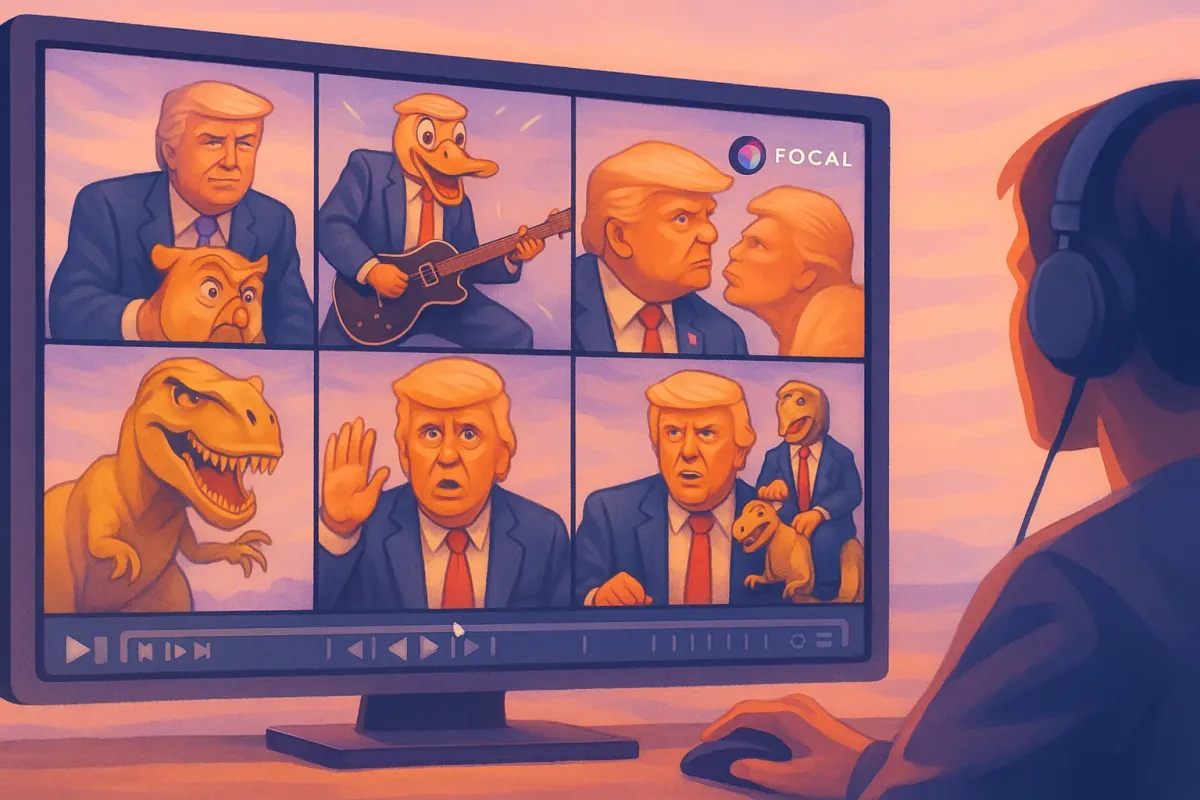Trump AI Video Trends and How These Clips Are Created

Trump AI video trends have taken over social media, with clips that range from satirical to surreal. Instead of dry political ads, audiences are seeing larger-than-life creations like Trump on Mount Rushmore, dancing with restaurant mascots, or even starring in futuristic scenarios. These clips are not just random memes. They showcase how far generative AI has come in producing persuasive, viral-ready content that blurs humor, propaganda, and entertainment.
The Types of Trump AI Videos Going Viral
AI content featuring Trump falls into several recognizable categories:
- Heroic Portraits. Iconic settings like Mount Rushmore or cinematic montages of his life story.
- Humor and Parody. Dancing with fictional characters, sumo wrestling matches, or slapstick comedy setups.
- Political Satire. Futuristic reimaginings such as “Trump Gaza,” which started as satire but was reposted as policy-inspired media.
- Dramatic Action Scenes. Deepfake videos of military strikes or dramatic interventions.
- Sentimental Storytelling. AI-generated “from childhood to present day” timelines set to emotional music.
These formats appeal because they mix entertainment value with political iconography, making them highly shareable.
Examples That Define the Trend
| AI Clip | Theme | Audience Reaction |
|---|---|---|
| Trump on Mount Rushmore | Heroic imagery | Viral on X with millions of views |
| Dancing with Cracker Barrel’s Uncle Herschel | Parody and nostalgia | Mixed humor and brand commentary |
| Trump in a Sumo Ring | Absurd spectacle | Shares for comedic shock value |
| “Forever Young” Life Story | Emotional montage | Viewed as eerie but moving |
| “Trump Gaza” Futuristic Video | Satirical vision | Controversial due to reinterpretation |
How These AI Videos Are Created
The clips use deepfake and generative AI models that rely on large training sets of Trump’s face, voice, and body movements. Here’s how the process typically works:
- Source Collection. Gather video and image data of Trump’s speeches, photos, and past media appearances.
- Model Training. Deep neural networks, often GANs, are tuned to replicate Trump’s likeness and expressions.
- Video Composition. AI maps his features onto actors, avatars, or animated bodies.
- Voice Synthesis. AI clones mimic his speaking style or repurpose existing audio.
- Styling and Editing. Music, backgrounds, or cinematic effects are layered in to enhance the spectacle.
What stands out is not just accuracy but speed. A polished video can be created in hours, making it easy to react to political events or trending topics in near real-time.
Why These Videos Spread Faster Than Traditional Ads
- Entertainment Value. They feel like memes rather than campaign material.
- Algorithmic Boost. Social platforms reward shareable, odd, or humorous content.
- Visual Shock Factor. Seeing Trump sumo wrestling is inherently unexpected.
- Ambiguity of Intent. Some viewers laugh, others take them seriously, which multiplies their reach.
This phenomenon has been described as “algo-fodder”. The videos are designed to feed social algorithms rather than to persuade through detailed messaging.
Political Impact and Concerns
AI Trump videos raise new questions about credibility and persuasion:
- Satire vs Reality. A satirical video may be reposted as genuine, confusing audiences.
- The “Liar’s Dividend”. Politicians can dismiss real footage as “probably AI,” reducing accountability.
- Desensitization. Constant exposure to bizarre or cartoonish content may make viewers less critical of misinformation.
- Meme Warfare. Campaigns recognize that a viral AI meme can outperform a traditional advertisement in reach and impact.
Key Takeaways About Trump AI Video Trends
- These clips are not fringe memes but part of a growing political communication strategy.
- They are cheap and fast to produce, yet powerful enough to dominate attention cycles.
- Formats range from heartfelt life stories to absurd comedy, giving them broad audience appeal.
- The blending of satire, parody, and propaganda creates a space where viewers struggle to separate fact from fiction.
Where These Trends Leave Us
Trump AI videos show how generative media can flip politics into something that feels more like pop culture. If you’ve been watching these clips and wondering how they get pulled off so quickly, the truth is that AI models now make it almost effortless to remix a familiar face into any story, joke, or cinematic vision. It’s not just about campaigns anymore, it’s about audiences expecting creativity and spectacle in the feeds they scroll every day.
If you’re curious about experimenting with the same kind of output, you don’t need a production team. Inside Focal, you can tap into AI video models to spin up your own viral-style content in minutes. It’s a simple way to play with the same formats you’ve seen blowing up online and see just how far you can push your own ideas.
AI-generated political clips are everywhere. Focal lets you create your own satirical or narrative videos with full control over tone and pacing.
📧 Got questions? Email us at [email protected] or click the Support button in the top right corner of the app (you must be logged in). We actually respond.
